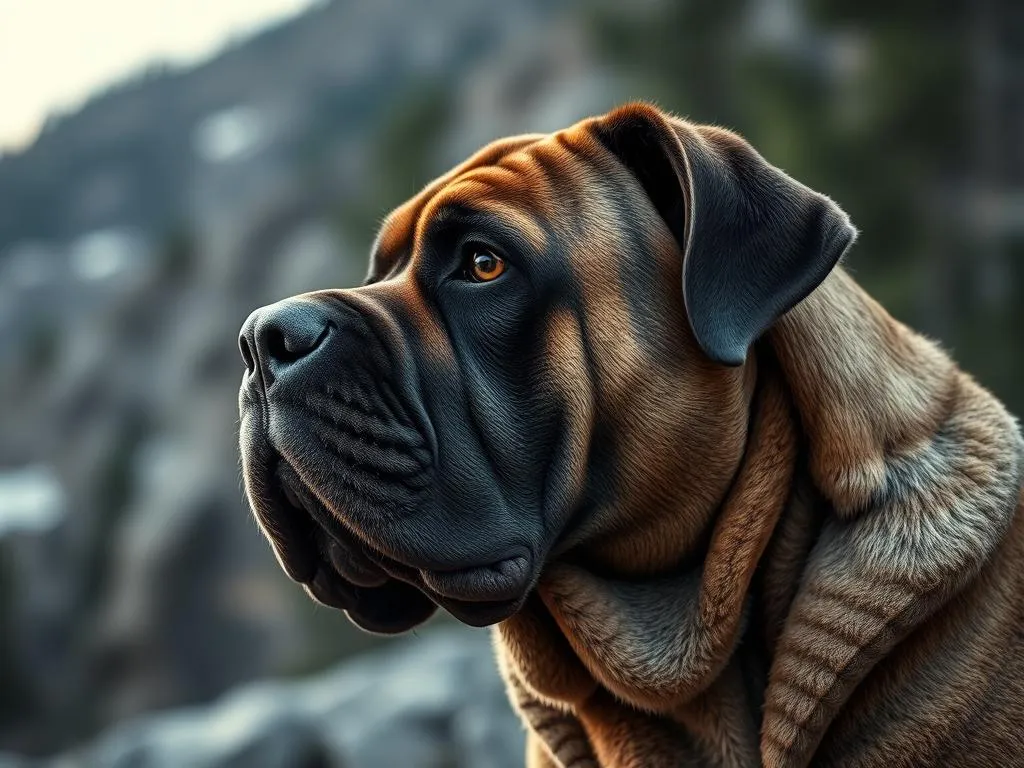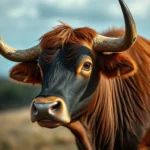
Dogs are known as man’s best friend, and their variety is a testament to their adaptability and companionship qualities. Among the countless breeds, the Mountain Mastiff stands out for its size, strength, and loyalty. This breed has a rich history and unique characteristics that make it an intriguing choice for dog lovers. Understanding the Mountain Mastiff can help potential owners make informed decisions about welcoming one of these magnificent animals into their home.
Understanding Dog Breeds
Definition of Dog Breeds
A dog breed is a specific group of domestic dogs that share common characteristics, including appearance, temperament, and behavior. These classifications arise from selective breeding practices aimed at enhancing desirable traits, whether for companionship, work, or show purposes. Breeds are often categorized based on their size, purpose, and origin, leading to the vast diversity of dogs we see today.
Importance of Dog Breeds
Different dog breeds play various roles in human society. For example, some are bred for companionship, like the Golden Retriever, while others serve specific functions, such as the German Shepherd in police work. Moreover, many breeds participate in competitive sports, showcasing their agility and intelligence. This diversity enriches our lives, offering options for every type of dog lover.
Overview of Popular Dog Breeds
In addition to the Mountain Mastiff, several breeds have garnered popularity due to their unique qualities. Breeds like the Labrador Retriever, known for their friendly demeanor, and the Bulldog, recognized for their distinct appearance, continue to captivate dog enthusiasts around the world. Each breed has its own set of characteristics that cater to different lifestyles and needs.
The Mountain Mastiff: An Overview
History of the Mountain Mastiff
The Mountain Mastiff, often known for its imposing size and protective nature, has its roots in ancient mastiff breeds. Originating from mountainous regions where they served as guarding and working dogs, they have been used for centuries to protect livestock and property. Their history is intertwined with various cultures, particularly in regions like Tibet, where they were bred for their strength and loyalty.
Ancestral breeds contributing to the Mountain Mastiff include the Tibetan Mastiff, known for its formidable presence and guarding instincts. This breed’s lineage reflects a combination of robustness and a protective temperament that has been honed over generations.
Physical Characteristics
The Mountain Mastiff is a large and powerful breed, typically weighing between 90 to 150 pounds and standing about 26 to 30 inches tall at the shoulder. Their size is complemented by a broad, muscular build that exudes strength and stability.
Coat Color and Texture
The coat of the Mountain Mastiff can vary in color, including shades of brindle, fawn, and black. Most have a dense double coat that serves as insulation in cold climates, making them well-suited for mountainous environments. Their coat requires regular grooming to manage shedding and maintain healthy skin.
Distinctive Features
Notable features of the Mountain Mastiff include a broad head, deep-set eyes, and a strong jaw. Their face often displays a calm and dignified expression, while their tail is thick and bushy, typically carried low. These physical traits not only add to their impressive appearance but also reflect their heritage as guardians and companions.
Temperament and Behavior
General Temperament
The Mountain Mastiff is known for its calm and gentle demeanor, making them excellent companions for families. Despite their size, they are often affectionate and loyal, forming strong bonds with their human family members. Their protective instincts make them especially vigilant, ensuring a safe environment for their loved ones.
Socialization Needs
Early socialization is crucial for the Mountain Mastiff to develop well-rounded behavior. Introducing them to various people, environments, and other animals helps them become more adaptable and confident. These dogs can be particularly good with children, given proper introductions and supervision. Their natural protective instincts often lead them to form strong bonds with kids, acting as both playmates and guardians.
Training Requirements
Training a Mountain Mastiff requires patience and consistency. They are intelligent but can also exhibit stubbornness, necessitating firm, yet positive reinforcement methods. Basic commands and socialization should start early, as well as addressing any behavioral issues promptly. Common challenges include their independent nature, which can lead to selective hearing if not addressed through engaging training techniques.
Health and Care
Common Health Issues
Like many large breeds, the Mountain Mastiff is prone to certain health issues. Some common concerns include:
- Hip Dysplasia: A genetic condition where the hip joint doesn’t fit into the hip socket properly.
- Obesity: Due to their size, maintaining a healthy weight is crucial to prevent additional health complications.
- Bloat: A serious condition where the stomach twists, requiring immediate veterinary attention.
Regular check-ups can help catch these issues early, ensuring that your Mountain Mastiff remains healthy and active.
Regular Health Care
Routine veterinary check-ups are essential for the Mountain Mastiff. Regular vaccinations, parasite control, and dental care should be part of their health regimen. Preventive care not only helps in identifying potential health issues early but also contributes to their overall well-being.
Grooming Needs
Grooming the Mountain Mastiff involves regular brushing to manage shedding and maintain their coat’s health. Depending on the season, they may require brushing 2-3 times a week. Bathing should be done as necessary, typically every few months, to keep their coat clean without stripping essential oils. Additionally, regular nail trimming and dental care are vital to their health.
Nutrition and Diet
Recommended Diet
A balanced diet is crucial for the health of a Mountain Mastiff. High-quality dog food, preferably formulated for large breeds, ensures they receive the necessary nutrients. Look for options rich in protein, healthy fats, and essential vitamins and minerals to support their overall health.
Portion Control
Feeding portions should be carefully controlled based on the dog’s age, weight, and activity level. Typically, adult Mountain Mastiffs require 4 to 6 cups of food daily, split into two meals to prevent bloat. Puppies, on the other hand, may require more frequent feeding with smaller portions to support their growth.
Treats and Supplements
Providing treats should be done in moderation, focusing on healthy options. Additionally, some owners may consider supplements, such as glucosamine, to support joint health, especially in older dogs. Always consult with a veterinarian before introducing new supplements to ensure they align with your dog’s health needs.
Living Environment
Ideal Living Conditions
The Mountain Mastiff thrives in environments where they have ample space to move and play. While they can adapt to apartment living, having a home with a yard is ideal. Their large size means they need room to stretch and exercise, so a suburban or rural setting is often more suitable.
Interaction with Family
These dogs are known for their loyalty and love for their families. They typically enjoy spending time with their human companions and often form close bonds. Their protective nature makes them excellent family pets, always on alert to ensure their loved ones are safe and secure.
Exercise Requirements
Daily exercise is essential for a Mountain Mastiff. They require moderate activity to maintain their physical health and prevent obesity. Engaging in walks, playtime, and even swimming can keep them active and happy. While they enjoy exercise, they also appreciate lounging around the house, balancing energy with relaxation.
Pros and Cons of Owning a Mountain Mastiff
Advantages
Owning a Mountain Mastiff comes with numerous benefits. Their loyalty and protective instincts make them excellent guard dogs, while their gentle nature often makes them great family pets. They are known for being calm and composed, which can bring a sense of stability to the household. Additionally, their impressive size can deter potential intruders.
Challenges
However, there are challenges to consider before bringing a Mountain Mastiff into your home. Their size can make grooming and transportation more cumbersome. Additionally, they may be prone to health issues, requiring regular veterinary visits and potential medical expenses. Their exercise needs, while moderate, still necessitate time and commitment from their owners.
Frequently Asked Questions (FAQs)
How much exercise does a Mountain Mastiff need?
A Mountain Mastiff typically requires moderate exercise, around 30 to 60 minutes daily, depending on their age and energy level. Regular walks and playtime are essential to maintain their health and prevent obesity.
Are Mountain Mastiffs good with children?
Yes, Mountain Mastiffs can be excellent companions for children. They are known for their protective instincts and gentle nature. However, supervision during interactions is essential to ensure both the dog and the children are safe.
What is the average lifespan of a Mountain Mastiff?
The average lifespan of a Mountain Mastiff is around 8 to 12 years. Regular veterinary care and a healthy lifestyle can help extend their lifespan and improve their quality of life.
How can I find a reputable breeder?
Finding a reputable breeder involves researching breed clubs and organizations dedicated to the Mountain Mastiff. Look for breeders who prioritize health testing and breed standard adherence. Visiting the breeder’s facility and meeting the puppies’ parents can provide insight into their breeding practices.
Conclusion
Understanding the Mountain Mastiff is essential for anyone considering this impressive breed. Their unique characteristics, temperament, and care requirements make them a remarkable addition to the right family. By recognizing the commitment involved in owning a Mountain Mastiff, potential owners can ensure that they provide a loving and suitable home for these magnificent dogs. Whether you’re drawn to their loyalty, protective nature, or gentle demeanor, the Mountain Mastiff can be a truly rewarding companion.









